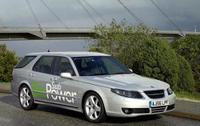Saab calls on UK Government to boost Biofuels
 Saab Great Britain has this week launched its second flex-fuel car, capable of running on eco-friendly renewable fuel source bioethanol E85, in the UK – the Saab 9-5 2.3t BioPower, which cuts fossil CO2 emissions by up to 70 per cent when running on bioethanol compared to when running on petrol. This car joins the existing Saab 9-5 2.0t BioPower, first deliveries of which began back in March, in the same week that Morrisons supermarket opened the UK’s first bioethanol E85 refuelling points across the UK.
Saab Great Britain has this week launched its second flex-fuel car, capable of running on eco-friendly renewable fuel source bioethanol E85, in the UK – the Saab 9-5 2.3t BioPower, which cuts fossil CO2 emissions by up to 70 per cent when running on bioethanol compared to when running on petrol. This car joins the existing Saab 9-5 2.0t BioPower, first deliveries of which began back in March, in the same week that Morrisons supermarket opened the UK’s first bioethanol E85 refuelling points across the UK. Jonathan Nash, Managing Director of Saab Great Britain Limited, says he has been encouraged by the developments he has seen with regards to the UK’s emerging bioethanol industry during the course of the last year, and comments: “Saab has been at the forefront of this movement right from the beginning, and now our efforts are paying off. In 2006, we have started to see all of the pieces of the jigsaw come together; flex-fuel cars are appearing on UK roads, bioethanol E85 pumps are being installed at a growing number of supermarket petrol forecourts, factories which produce the ethanol are starting to be built, and UK farmers are looking forward to being paid a fair commercial price for their crops, instead of being subsidised not to grow anything!”
However, Nash feels that there is still much to be done and puts the responsibility for this squarely at the feet of the UK Government: “What we need now is some meaningful Government intervention. So far, the UK Government has done little to encourage the public into driving cars that can run on eco-friendly fuel sources such as bioethanol E85, whose overall carbon dioxide (CO2) emissions have been independently shown to be between 50 and 70 per cent lower than emissions from petrol. A mere £10 reduction in Vehicle Excise Duty (VED) and a 20 pence per litre tax rebate on biofuels is not enough to stimulate this new market,” says Nash.
He continues: “Upon publication of the Stern Review last week, the British Government claimed to be leading the global debate on Climate Change. Well I don’t see much evidence of that. What I see is the Swedish Government taking progressive measures, such as major tax relief at the pump and for company car drivers, and free parking in Swedish cities to encourage drivers into environmentally-friendly cars, instead of penalising them. I see the French Government making positive steps towards encouraging the use of flex-fuel cars by considering proposals to tax bioethanol E85 at the lowest rate permitted by EU legislation and the introduction of incentives to encourage large companies to buy flex-fuel cars. I see the Irish government offering a 50 per cent refund on Vehicle Registration Tax for flex-fuel cars, equating to savings equivalent to £3,000, and the Japanese Ministry of Agriculture promising to subsidise the construction and operating costs of new biofuel plants using budget money in order to kickstart a domestic biofuels industry. In summary, I see many other governments, both inside and out of Europe, taking far more radical steps than the UK to combat climate change. Those are the nations who are really leading this debate.”
Last week, Nash was a co-signatory of a letter to the Chancellor of the Exchequer from a cross-industry group, consisting of the National Farmers’ Union (NFU), Saab Great Britain (under parent company General Motors), Ford Motor Company and Morrisons supermarket. In this letter, the Chancellor was urged to introduce financial incentives to develop the UK biofuel industry in his 2007 budget. These include:
Increase and prolong the fuel duty rebate applied to bioethanol E85
Discount company car tax for high blend biofuel cars
Revise vehicle excise duty to reflect more accurately substantial benefits of these cars
Nash explains that much of his frustration stems from seeing what can be achieved when national government is forward-thinking and joined-up in its approach. In Saab’s home market of Sweden, environmentally-friendly cars now make up 13 per cent of the new car market, with flex-fuel cars accounting for the bulk of those. “Saab will sell some 10,000 9-5 BioPower cars in Sweden in 2006, due to the fact that one flex-fuel engine has accounted for over 80 per cent of Saab 9-5 sales during the course of the year,” he points out. “The Swedish government has been extremely progressive and proactive in its policies, giving both private and company car drivers a reason to get in to alternative-fuelled cars, and incentivising fuel suppliers to provide the environmentally-friendly fuel. All of these policies form part of Sweden’s recently-stated aim of being completely fossil fuel free by 2020 – now that’s what I call leading the debate on climate change,” says Nash.

